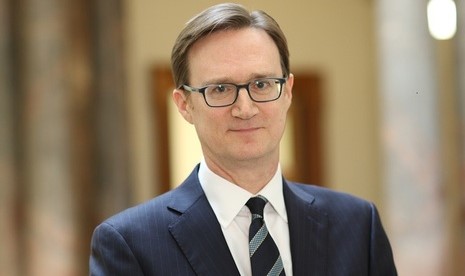THE British High Commissioner to Nigeria, Dr. Richard Montgomery, has declared that Nigeria’s ongoing economic reforms, though painful, are beginning to yield tangible results that are transforming the country into a magnet for foreign investment.
Speaking in Abuja during in an interview, Montgomery revealed that British investors are showing unprecedented interest in Nigeria, with bilateral trade between both countries already soaring to a record £7.9 billion (₦16 trillion).
According to Montgomery, President Bola Ahmed Tinubu’s reform agenda including monetary policy adjustments, subsidy removal, and fiscal tightening is attracting long-term capital into Nigeria’s key growth sectors such as technology, finance, energy, agriculture, and the creative industries.
“Nigeria does not want a donor; it wants a partner. That is precisely the role the UK seeks to play,” he said, stressing that reforms are essential to bridge the gap between Nigeria’s rapid population growth and its previously sluggish GDP performance.
He credited President Tinubu, Finance Minister Wale Edun, and Central Bank Governor Yemi Cardoso for laying the foundation for economic stability.
Already, inflation has dropped from above 30 percent to near 20 percent, foreign reserves have climbed to $42 billion, and fiscal allocations to states have increased boosting subnational stability.
Montgomery said the UK’s engagement with Nigeria has moved away from traditional aid, which now accounts for less than two percent of Nigeria’s GDP, to a reform-driven strategic partnership anchored on the Enhanced Trade and Investment Partnership (ETIP) signed last year.
The ETIP, described as a “vehicle for unlocking jobs and investment,” targets critical areas such as clean energy, agriculture, higher education, health, financial services, and creative industries.
British International Investment (BII), the UK’s development finance institution, has a Nigerian portfolio worth nearly £700 million, with funds directed into agribusiness, SMEs, and renewable energy projects.
The UK has also committed $7.5 million specifically to Nigerian agribusiness, aiming to boost productivity and enhance export standards.
Montgomery noted that more than 3,000 Nigerian products already enjoy tariff-free access under the UK’s Developing Country Trading Scheme, though he warned that non-tariff barriers like poor packaging and certification still limit Nigeria’s export potential.
He also highlighted the UK’s growing footprint in Nigeria’s tech and creative sectors, with London Mayor Sadiq Khan’s recent mission opening doors for startup partnerships.
UK universities, he disclosed, are exploring joint campuses in Nigeria to reduce outbound student migration, while reforms at Nigeria’s Federal Inland Revenue Service (FIRS), inspired by the UK’s HMRC, are improving tax efficiency without raising rates.
On migration, Montgomery addressed concerns over new UK visa restrictions, clarifying that recent rules on student dependents are global, not Nigeria-specific. He revealed that 260,000 visas were issued to Nigerians last year, making Nigeria one of Britain’s largest migration partners worldwide, with approval rates as high as 95 percent for student visas.
On security, the envoy reaffirmed Britain’s commitment to Nigeria’s counter-terrorism fight through the UK-Nigeria Security and Defence Partnership, which has delivered counter-IED training, intelligence sharing, and equipment support.
He also warned of growing instability in the Sahel region, citing conflicts in Sudan, Mali, and Niger worsened by Russian mercenary activity, but praised Nigeria’s leadership in regional diplomacy and counter-insurgency operations.
“The UK will continue to support Nigeria when invited, through training, technical expertise, or intelligence sharing. But the leadership of Nigeria’s security architecture is crucial, and we have confidence in their ability to chart the right path,” Montgomery affirmed.







